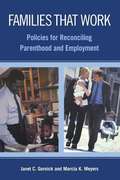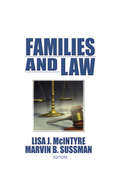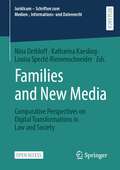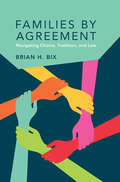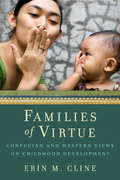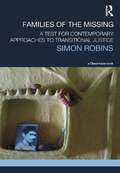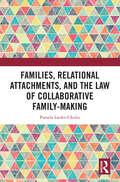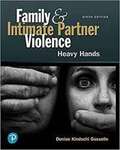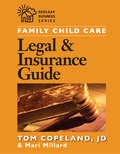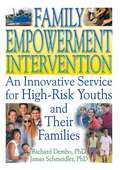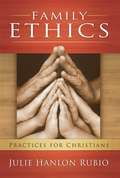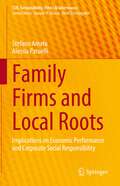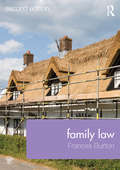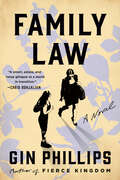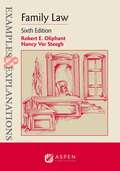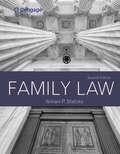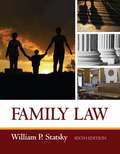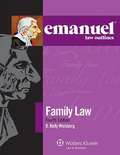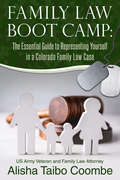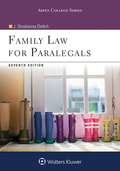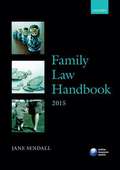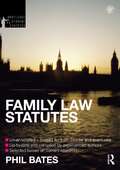- Table View
- List View
Families That Work: Policies For Reconciling Parenthood And Employment
by Janet C. Gornick Marcia K. MeyersParents around the world grapple with the common challenge of balancing work and child care. Despite common problems, the industrialized nations have developed dramatically different social and labor market policies--policies that vary widely in the level of support they provide for parents and the extent to which they encourage an equal division of labor between parents as they balance work and care. In Families That Work, Janet Gornick and Marcia Meyers take a close look at the work-family policies in the United States and abroad and call for a new and expanded role for the U. S. government in order to bring this country up to the standards taken for granted in many other Western nations. In many countries in Europe and in Canada, family leave policies grant parents paid time off to care for their young children, and labor market regulations go a long way toward ensuring that work does not overwhelm family obligations. In addition, early childhood education and care programs guarantee access to high-quality care for their children. In most of these countries, policies encourage gender equality by strengthening mothers' ties to employment and encouraging fathers to spend more time caregiving at home. In sharp contrast, Gornick and Meyers show how in the United States--an economy with high labor force participation among both fathers and mothers--parents are left to craft private solutions to the society-wide dilemma of "who will care for the children?" Parents--overwhelmingly mothers--must loosen their ties to the workplace to care for their children; workers are forced to negotiate with their employers, often unsuccessfully, for family leave and reduced work schedules; and parents must purchase care of dubious quality, at high prices, from consumer markets. By leaving child care solutions up to hard-pressed working parents, these private solutions exact a high price in terms of gender inequality in the workplace and at home, family stress and economic insecurity, and--not least--child well-being. Gornick and Meyers show that it is possible-based on the experiences of other countries--to enhance child well-being and to increase gender equality by promoting more extensive and egalitarian family leave, work-time, and child care policies. Families That Work demonstrates convincingly that the United States has much to learn from policies in Europe and in Canada, and that the often-repeated claim that the United States is simply "too different" to draw lessons from other countries is based largely on misperceptions about policies in other countries and about the possibility of policy expansion in the United States.
Families and Law
by Marvin B Sussman Lisa J McintyreThe family and the law, with its attendant legal systems, share a pervasive connectedness. With this new volume, family practitioners and scholars can begin to increase the family?s position in relation to the law and legal system. The contributing authors bring to light the power of laws and the ways to influence them,for the benefit of the family.
Families and New Media: Comparative Perspectives on Digital Transformations in Law and Society (Juridicum – Schriften zum Medien-, Informations- und Datenrecht)
by Louisa Specht-Riemenschneider Nina Dethloff Katharina KaeslingThe open access edited volume addresses children’s rights and their ability to act in the digital world. The focus is on the position of children as subjects with their own rights and developing capacities. Their consideration by parents, courts and legislators is critically examined. Aspects of digital parenting, especially educational practices and strategies in the context of social media, are analyzed with regard to the tension between protection and participation of children. The edited volume brings debates on privacy and data protection together with those from tort, family and intellectual property law, while also examining the role of families and children in the regulation of data and digital economies, especially online platforms. Legal reflections from Germany, Israel, Portugal and the United States of America are complemented by perspectives from media studies, political science, educational science and sociology of law.
Families by Agreement: Navigating Choice, Tradition, and Law
by Brian H. BixIn this highly original work, renowned family and contract law expert Brian H. Bix explores the increasing legal recognition of private ordering in American family law. Today, individuals can alter the terms of a marriage and divorce through agreements, and courts sometimes allow individuals to create, waive, and alter parental rights by way of surrogacy, open adoption, and co-parenting agreements, among other mechanisms. But when is such private ordering beneficial to all, and when should it be regulated or prohibited? Families by Agreement explores these questions in accessible detail to provide an important resource for those who litigate in these areas and for those who want to be thoughtful participants in these moral and policy debates.
Families of Virtue
by Erin M. ClineFamilies of Virtue reads a range of thinkers and scientists, from ancient Greek and Chinese philosophers to contemporary feminist ethicists and attachment theorists, to articulate the critical role of the parent-child relationship in the moral development of infants and children. Arguing that philosophy can support our best empirical findings to shape effective policy, this book seeks to strengthen families, help raise happier children, and successfully address current moral problems.Early Confucian philosophers argue that the general ethical sensibilities we develop during infancy and early childhood form the basis for nearly every virtue and that the parent-child relationship is the primary context within which this growth occurs. Joining these views with scientific work on early childhood, the text shows how an extensive body of research in Western psychology can bolster and renew the theoretical underpinnings of Confucian thought. Confucian philosophers can therefore help promote positive social and political change in our time, particularly in such surprising areas as paid parental leave, breastfeeding initiatives, marriage counseling, and family therapy.
Families of Virtue: Confucian and Western Views on Childhood Development
by Erin ClineFamilies of Virtue articulates the critical role of the parent–child relationship in the moral development of infants and children. Building on thinkers and scientists across time and disciplines, from ancient Greek and Chinese philosophers to contemporary feminist ethicists and attachment theorists, this book takes an effective approach for strengthening families and the character of children.Early Confucian philosophers argue that the general ethical sensibilities we develop during infancy and early childhood form the basis for nearly every virtue and that the parent–child relationship is the primary context within which this growth occurs. Joining these views with scientific work on early childhood, Families of Virtue shows how Western psychology can reinforce and renew the theoretical underpinnings of Confucian thought and how Confucian philosophers can affect positive social and political change in our time, particularly in such areas as paid parental leave, breastfeeding initiatives, marriage counseling, and family therapy.
Families of the Missing: A Test for Contemporary Approaches to Transitional Justice
by Simon RobinsFamilies of the Missing interrogates the current practice of transitional justice from the viewpoint of the families of those disappeared and missing as a result of conflict and political violence. Studying the needs of families of the missing in two contexts, Nepal and Timor-Leste, the practice of transitional justice is seen to be rooted in discourses that are alien to predominantly poor and rural victims of violence, and that are driven by elites with agendas that diverge from those of the victims. In contrast to the legalist orientation of the global transitional justice project, victims do not see judicial process as a priority. Rather, they urgently seek an answer concerning the fate of the missing, and to retrieve human remains. As important are livelihood issues where families are struggling to cope with the loss of breadwinners and seek support to ensure economic security. Although rights are the product of a discourse that claims to be global and universal, needs are necessarily local and particular, the product of culture and context. And it is from this perspective that this volume seeks both to understand the limitations of transitional justice processes in addressing the priorities of victims, and to provide the basis of an emancipatory victim-centred approach to transitional justice.
Families, Relational Attachments, and the Law of Collaborative Family-Making
by Pamela Laufer-UkelesThis book points to a crisis at the heart of modern family law’s treatment of “collaborative family-making”: gamete contributions, surrogate motherhood, adoption, functional parenthood, foster care, and kin caregiving. Born of inequality and anchored by exclusivity and secrecy, the dominant legal framework governing collaborative family-making focuses on the acquisition of collaborative services by legal and intended parents without expecting or fostering any lasting bonds between them. This acquisitional framework is starkly disconnected from empirical accounts of the lived experience of collaborations, which demonstrate complex and ongoing relational attachments that extend beyond a transactional moment. At the intersection of law and sociology, the book is to account for relational realities that fail to conform to neat legal categories of parent and stranger, asking: How should the law reflect the complex interconnections between families and family-making collaborators? Should collaborators be treated as legal strangers? Who is impacted by the lack of legal status possessed by family-making collaborators? Who benefits and who loses? Ultimately, this is a work of optimism that seeks to facilitate family-making collaborations in more ethical ways by insisting that family law recognize and support family-making collaborators. It introduces a bold new legal framework of interconnection and guides the reader in implementing practical legal and contractual changes that promote human dignity, uphold children’s right to identity, and support ongoing relational attachments with adults who are fundamental to children’s lives. The volume provides deep and accessible insight into families and family law for legal practitioners, academics, students, and laypersons interested in family-making collaboration.
Family And Intimate Partner Violence: Heavy Hands
by Denise GosselinFor courses in domestic violence, family violence, and victimology. <P><P> The authoritative introduction to family violence Family and Intimate Partner Violence: Heavy Handsis an authentic introduction to the crimes of family violence, covering offenders and offenses, impact on victims, and responses of the criminal justice system. Comprehensive yet easy to understand, this established text is essential reading for students considering careers in criminal justice, victim advocacy, social work, or counseling. Gosselin draws on extensive field experience and real¿ examples to explain abuse and its effects on survivors. The 6th edition includes a new chapter on adolescent and young adult victimization, as well as updates to topics of interest such as intimate partner violence, asylum law, and theoretical perspectives.
Family Child Care Legal and Insurance Guide
by Tom Copeland Mari MillardThis easy-to-read guide takes the intimidation out of running a family child care business through legal and insurance planning. From researching and purchasing homeowner's, liability, auto and disability insurance to protecting against lawsuits, the Family Child Care Legal and Insurance Guide details the many practical ways business owners can maximize their knowledge about the safeguards needed to ensure the health and prosperity of their businesses.
Family Empowerment Intervention: An Innovative Service for High-Risk Youths and Their Families
by Letitia C Pallone Richard Dembo Robert James SchmeidlerUse this important intervention to improve your practice with substance-using youths and their families!This vital book gives you a detailed review of a National Institute on Drug Abuse-funded, long-term clinical trial of the Family Empowerment Intervention (FEI). The subjects are youths who have been arrested and processed at the Hillsborough County Juvenile Assessment Center and their families. With information on the conceptual foundations and clinical practices of the intervention and an examination of its one-year and longer-term impact on these youths&’ recidivism and psychosocial functioning, Family Empowerment Intervention: An Innovative Service for High-Risk Youth and Their Families will help you provide better services to these difficult-to-serve clients.Bringing you up-to-date on all aspects of this unique intervention, this book: examines the pressing need for this kind of intervention gives you an essential overview of the FEI describes the selection process for subject involvement in the project and the methods of data collection used examines the FEI&’s impact on crime as well as its short- and long-term impact on and drug and alcohol use suggests ways to improve the FEIComplete with dozens of easy-to-understand tables and figures as well as five helpful appendixes, this well-referenced volume is essential reading for anyone working with this highly volatile population. Make it a part of your collection today!
Family Ethics: Practices For Christians
by Julie Hanlon RubioHow can ordinary Christians find moral guidance for the mundane dilemmas they confront in their daily lives? To answer this question, Julie Hanlon Rubio brings together a rich Catholic theology of marriage and a strong commitment to social justice to focus on the place where the ethics of ordinary life are played out: the family. Sex, money, eating, spirituality, and service. According to Rubio, all are areas for practical application of an ethics of the family. In each area, intentional practices can function as acts of resistance to a cultural and middle-class conformity that promotes materialism over relationships. These practices forge deep connections within the family and help families live out their calling to be in solidarity with others and participate in social change from below. It is through these everyday moral choices that most Christians can live out their faith-and contribute to progress in the world.
Family Firms and Local Roots: Implications on Economic Performance and Corporate Social Responsibility (CSR, Sustainability, Ethics & Governance)
by Stefano Amato Alessia PatuelliThis book pursues an interdisciplinary approach to studying family firms as a particular type of business strongly embedded in the territories in which they are located. Featuring an in-depth analysis of original research, the book employs both theoretical and empirical approaches to explore family firms and their relationships with their home territories. The book shows that family firms have unique bonds with their local areas, and these bonds profoundly shape their decision-making and outcomes.The book addresses two research questions, namely, how the connections between family firms and their home territories originate and develop, and how they influence firms’ economic performance and their corporate social responsibility initiatives. Uniquely, it seeks to develop an integrated framework that brings together family firms, local contexts, and places while also presenting new empirical evidence of relevance to scholars, managers, and policymakers alike. In addition, the book responds to the need for a greater understanding of what anchors entrepreneurial families to their home territories and the conditioning effect of local roots on such firms’ behavior.
Family Law
by Frances BurtonFamily Law provides a comprehensive foundation in the key topics covered by courses. It explains the basic principles of the law and practice in their social, economic and historic context, enabling the reader to understand the doctrinal and practical impact of current radical changes in family law in response to cultural and other influences. This second edition has been fully updated in the light of on-going changes to the family justice system including: the modernisation of family justice including the new Family Court Atypical formation of the contemporary family: genetic, adoptive, social or through HAR the proposed administrative extra-judicial divorce process financial orders on married and unmarried family relationship breakdown enhanced parental responsibility, ‘Parental Agreements’ and ‘Child Arrangement Orders’ the treatment of post separation parenting (and the new DWP child support system) reforms to public child law, including changes to adoption same-sex marriage and the impact on traditional marriage and cohabitation Visit the companion website for practice questions, updates to the law and podcasts by the author at http://www.routledge.com/cw/burton-9780415583640
Family Law
by Gin PhillipsWhen an ambitious female lawyer becomes the victim of harassment, she must decide what's more important: her family's safety or the rights she's fighting for.Set in Alabama in the early '80s, Family Law follows a young lawyer, Lucia, who is making a name for herself at a time when a woman in a courtroom is still a rarity. She's been the recipient of threats and vandalism for her work extracting women from painful and sometimes dangerous marriages, but her own happy marriage has always felt sheltered from the work she does. When her mother's pending divorce brings teenaged Rachel into Lucia's orbit, Rachel finds herself smitten--not just with Lucia, but with the change Lucia represents. Rachel is outspoken and curious, and she chafes at the rules her mother lays down as the bounds of acceptable feminine behaviour. In Lucia, Rachel sees the potential for a new path into womanhood. But their unconventional friendship takes them both to a crossroads. When a moment of violence--a threat made good--puts Rachel in danger, Lucia has to decide how much her work means to her and what she's willing to sacrifice to keep moving forward.Written in alternating voices from Lucia and Rachel's perspectives, Family Law is a fresh take on what the advancement of women's rights looks like on the ground to the ordinary women and girls who imagine a world redefined. Addressing mother-daughter relationships and what roles we can play in the lives of women who aren't our family, the novel examines how we shape each other and how we make a difference. The funny, strong and yet tender-hearted female leads of Family Law illuminate a new kind of Southern women's fiction--atmospheric, rich, and with quietly surprising twists and nuances all its own.
Family Law
by Robert E. Oliphant Nancy Ver SteeghA favorite classroom prep tool of successful students that is often recommended by professors, the Examples & Explanations (E&E) series provides an alternative perspective to help you understand your casebook and in-class lectures. Each E&E offers hypothetical questions complemented by detailed explanations that allow you to test your knowledge of the topics in your courses and compare your own analysis. Here's why you need an E&E to help you study throughout the semester: Clear explanations of each class topic, in a conversational, funny style. Features hypotheticals similar to those presented in class, with corresponding analysis so you can use them during the semester to test your understanding, and again at exam time to help you review. It offers coverage that works with ALL the major casebooks, and suits any class on a given topic. The Examples & Explanations series has been ranked the most popular study aid among law students because it is equally as helpful from the first day of class through the final exam.
Family Law
by William P. StatskyIntroduce modern family law to today's paralegals with an emphasis on both substantive and procedural law. The strong practical focus in Statsky's FAMILY LAW, 7E helps students make sense of exclamatory headlines, talk shows, print and social media that often depict society in a litigation frenzy. Your students gain an accurate picture of family law and the role of today's attorney-paralegal team as they examine issues truly impacting family law, such as no-fault divorce, the women’s movement, and the impact of science and technology on concepts of parentage. Engaging changes, such as new mechanisms for pursuing parents not paying child support and the court's support of unmarried fathers seeking to undo their children's adoptions, keep students involved. In addition to fundamental principles of family law and current nationwide legal practices, this edition and MindTap digital resources offer state-specific assignments and legal analysis exercises for applying substantive law principles. Forms, documents, cases and exhibits further prepare readers to work with the actual tools and processes family law professionals use today.
Family Law (Sixth Edition)
by William P. StatskyFAMILY LAW, sixth edition, provides a comprehensive introduction to modern family law for the paralegal, covering substantive and procedural law with a strong practical emphasis. In addition to fundamental principles of family law and nationwide legal practices, the book includes state-specific assignments to help you identify relevant laws and regulations in your area. Legal analysis exercises help you apply substantive law principles discussed in each chapter, while sample checklists, forms, documents, cases, and exhibits provide exposure to real-world tools and processes used by working professionals. New content for the sixth edition includes updated coverage of evolving legal issues such as same-sex marriage, adoption, fertility, stem cell research, material on legal ethics, and the role of technology in law.
Family Law (The Emanuel Law Outlines Series): Fourth Edition
by D. Kelly WeisbergThis book is designed to help you understand the importance of both state and federal regulation of Family Law.
Family Law 2nd edition
by Leslie J. Harris Lee E. Teitelbaum Carol WeisbrodComprehensive overview of marital and other laws.
Family Law Boot Camp: The Essential Guide to Representing Yourself in a Colorado Family Law Case
by Alisha Taibo CoombeAre you going through a divorce, custody or other family law case? Are you representing yourself or wishing you understood the process? Family Law Boot Camp explains every step of the process without all the legal jargon at a fraction of the cost of calling an attorney. This thorough and eminently helpful guide takes you from the very start of your case choosing which forms you need through your closing argument in trial, with citations to real law you will need to use. You will learn how to draft legal documents, select witnesses, object, and enter evidence at trial. While the author of this book is based in Colorado and uses Colorado law as the premise of this book, Family Law Boot Camp will help you understand every step of your case so you can prepare and present it in the most effective way possible. A must-have for anyone involved in a family law matter. In this book you will find: -A helpful glossary of legal terms -Sample legal documents such as witness disclosure -Tips on dealing with a difficult opposing counsel -Advice from other attorneys and judges -A sample trial plan, trial outline, opening statement, closing argument, and objections! This concise, easy-to-understand guide will help you navigate your case effectively and painlessly.
Family Law For Paralegals (Aspen College)
by J. Shoshanna EhrlichFamily Law for Paralegals, 7E is a comprehensive text for family law, offering complete coverage of the basics of family law, combined with historical context and insight into topics of current interest. This thoughtful and carefully written textbook offers the nuts-and-bolts of the law, framed in historical context and include exposure to some of the most dynamic issues in family law today. The text’s comprehensive coverage includes basic coverage of the issues of marriage and divorce, as well as cutting-edge issues such as non-marital families, child abuse and neglect, child support and custody, and same-sex marriage.
Family Law Handbook
by Jane SendallProviding a comprehensive guide to the subject, Family Law Handbook focuses on relationship breakdown, money and property, children, and civil partnership.
Family Law Reimagined
by Jill Elaine HasdayOne of the law's most important and far-reaching roles is to govern family life and family members. Family law decides who counts as kin, how family relationships are created and dissolved, and what legal rights and responsibilities come with marriage, parenthood, sibling ties, and other family bonds. Yet despite its significance, the field remains remarkably understudied and poorly understood both within and outside the legal community. Family Law Reimagined is the first book to evaluate the canonical narratives, examples, and ideas that legal decisionmakers repeatedly invoke to explain family law and its governing principles. These stories contend that family law is exclusively local, that it repudiates market principles, that it has eradicated the imprint of common law doctrines which subordinated married women, that it is dominated by contract rules permitting individuals to structure their relationships as they choose, and that it consistently prioritizes children's interests over parents' rights. In this book, Jill Elaine Hasday reveals how family law's canon misdescribes the reality of family law, misdirects attention away from the actual problems that family law confronts, and misshapes the policies that legal authorities pursue. She demonstrates how much of the "common sense" that decisionmakers expound about family law actually makes little sense. Family Law Reimagined uncovers and critiques the family law canon and outlines a path to reform. Challenging conventional answers and asking questions that judges and lawmakers routinely overlook, it calls on us to reimagine family law.
Family Law Statutes 2012-2013: Family Law 2012-2013 (Routledge Student Statutes)
by Phil Bates‘Focused content, layout and price - Routledge competes and wins in relation to all of these factors’ - Craig Lind, University of Sussex, UK ‘The best value and best format books on the market.’ - Ed Bates, Southampton University, UK Routledge Student Statutes present all the legislation students need in one easy-to-use volume. Developed in response to feedback from lecturers and students, this book offer a fully up-to-date, comprehensive, and clearly presented collection of legislation - ideal for LLB and GDL course and exam use. Routledge Student Statutes are: • Exam Friendly: un-annotated and conforming to exam regulations • Tailored to fit your course: 80% of lecturers we surveyed agree that Routledge Student Statutes match their course and cover the relevant legislation • Trustworthy: Routledge Student Statutes are compiled by subject experts, updated annually and have been developed to meet student needs through extensive market research • Easy to use: a clear text design, comprehensive table of contents, multiple indexes and highlighted amendments to the law make these books the most student-friendly Statutes on the market Competitively Priced: Routledge Student Statutes offer content and usability rated as good or better than our major competitor, but at a more competitive price • Supported by a Companion Website: presenting scenario questions for interpreting Statutes, annotated web links, and multiple-choice questions, these resources are designed to help students to be confident and prepared.
